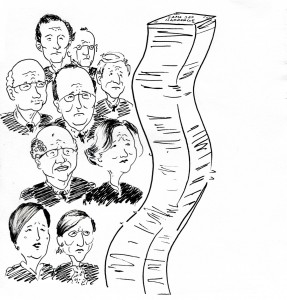Momentum is gathering for gay rights.
Across the state, students and lawmakers are confronting the issue of funding LGBT resource centers and Facebook users supporting gay rights have taken to changing their profile picture to equal signs and voicing their opinions on both sides. In Washington, D.C., the Supreme Court is two cases that could change years of legislation used to repress the rights of anti-lesbian, gay, bisexual and transgender legislation.

David Delgado/The Daily Cougar
The cases before the Supreme Court, Windsor v. United States, which challenges the constitutionality of the Defense of Marriage Act, and Hollingsworth v. Perry, which challenges California’s infamous Proposition 8 banning same-sex marriage. The court has the ability to issue broad rulings either way that would change the gay rights movement for generations.
All speculation points to the court making some sort of ruling in favor gay rights proponents, either narrowly or broadly, and that is for the best. No government should pass laws that restrict the rights of citizens without some sort of definitive constitutional objection. Religious freedom swings both ways, not just in the favor of Christian conservatives.
Media personalities see the writing on the wall as well. Prominent ultra-conservative talk radio host Rush Limbaugh, an opponent to gay marriage, said defeat is inevitable.
“This issue is lost,” he said. “I don’t care what the Supreme Court does.”
Townhall.com columnist Kurt Schlichter, a conservative lawyer who opposes gay marriage, also predicts fellow opposers to lose the fight against gay marriage.
“Whether the fight ends with a Constitution-twisting Supreme Court ruling or after years or decades as the states adopt it one by one, it’s a done deal,” he said in a Monday article.
Two key conservative media figures both admitting defeat on the issue doesn’t bode well for opponents of gay marriage. The days of same-sex marriage being federally unrecognized are probably over, and perhaps every amendment nationwide banning it could all be wiped away come June.
A new America is on the horizon, one in which we uphold the Declaration of Independence and allow same-sex couples to find fulfillment of their pursuit of happiness without guilt or shame as heterosexual couples enjoy.
Lorraine Schroeder, director of UH’s LGBT Resource Center, said she had a positive outlook.
“In general, having same-sex marriage, whenever you have a marginalized population, when there is a law passed that makes them less marginalized, benefits everybody,” she said.
“With young people who are LGBT, (it allows them to) accept their identity without the guilt and shame that many times comes with gay or bisexual orientation because of the negative messages they get from society.”
Schroeder said that if LGBT marriages were more commonplace, society would become less homophobic.
Journalism freshman Jose Iraheta, a homosexual student, said he agrees.
“If DOMA is repealed, it could show the world that same-sex couples are same-sex couples, and we’re just good people (like) you all are, and we aren’t the monsters that people say we are,” he said. “Over time, with DOMA repealed, we can finally progress our country so that more people can live their lives the way they want without fear.”
Political science senior Michele Gaddis, who is bisexual, alludes to marriage as a whole being beneficial to society.
“First thing you have to ask yourself is does marriage have any benefit to society? If it can be shown — perhaps through sociology, psychology, anthropology, et cetera — that marriage, regardless of how it is defined, has any benefit to society, then it extends logically that marriage in general regardless of the gender of the people being married is beneficial to society as a whole,” Gaddis said.
The LGBT community has sizeable support from heterosexual UH students and alumni. Alumnus Mike Kiely said he does not see any harm in letting same-sex couples marry and that this can only be good thing for everyone.
“It’s government getting out of your personal lives,” he said. “It’s also more opportunities for everyone. It makes sense to both liberals and conservatives.”
This is not to say that religious rejections of same-sex marriage and are not valid, only that it is not valid to deny them the same rights as anyone else. Ideally, laws should be crafted that protects religious centers that choose not to marry same-sex couples, but also recognize and protect the centers that do.
It is not the business of any government to tell consenting adults who to love and how to express that love.
Jacob Patterson is a management information systems senior and Aaron Manuel is a print journalism senior. They may be reached opinion@thedailycougar.com.
